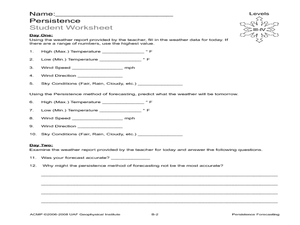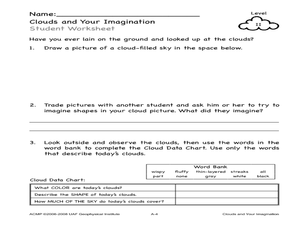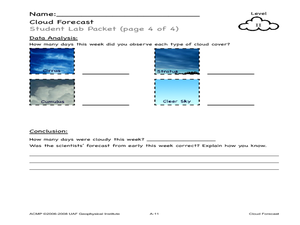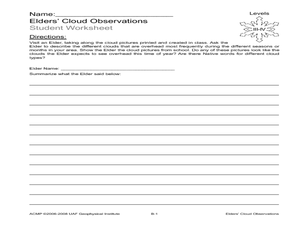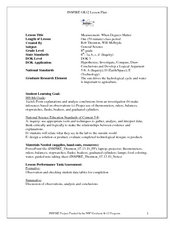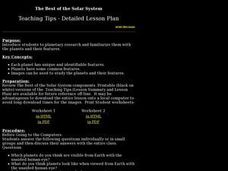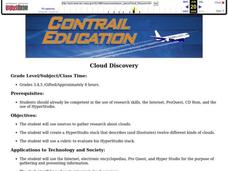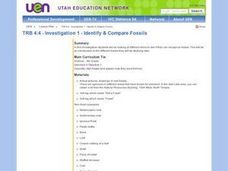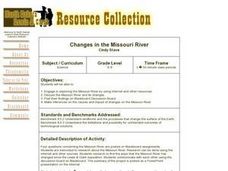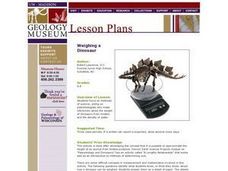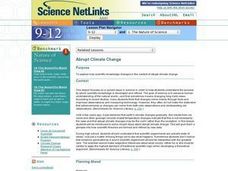Curated OER
Testing Weather Proverbs
Students study weather proverbs. In this weather lesson, students list weather proverbs and complete the worksheet to test the proverb. Students design an experiment to test the weather proverbs and conduct the experiments.
Curated OER
Fossil Footsteps
Fourth graders create their own dinosaur tracks using clay. In addition, 4th graders compose a story about the dinosaur / animal who created the tracks. They study photographs of dinosaur tracks before beginning.
Curated OER
Persistence Forecasting
Students study weather forecasting. In this weather lesson, students explore forecasting weather methods and do a forecast. Students study weather reports and discuss the elements of a forecast. Students study the method of persistence...
Curated OER
Clouds and Your Imagination
Students study and illustrate clouds. In this cloud study lesson, students study clouds and then illustrate what they see. Students use their imaginations to interpret images from the cloud picture they drew.
Curated OER
Wind
Students complete activities to study wind intensity. In this wind study lesson, students discuss wind speed and direction. Students then build a kite and windsock to help them study wind intensity. Students learn to use a wind meter for...
Curated OER
Fishkill
Students analyze data to determine the effect of thermal pollution on a certain species of fish. They graph temperature and dissolved oxygen and make inferences on the impact a change in temperature could have on the fish. As a class...
Curated OER
A Thoreau Look at Our Environment
Sixth graders write journal entries o school site at least once during each season, including sketched and written observations of present environment. They can use sample topographical maps and student's own maps. Students can use...
Curated OER
Metal Composition & the U.S. Mint
Students study the meaning, symbolism, and value of U.S. coins,
especially the quarter. Theyresearch why in 1965 the U.S. Mint decided to
change the metal composition of the quarter to copper coated with nickel.
In addition, they perform...
Curated OER
Clouds as Art: Torn Paper Landscape
Students create a torn paper landscape and use it to study clouds. In this cloud study and art lesson, students make a background art image from torn paper. Students create a torn paper landscape and use cotton balls to illustrate...
Curated OER
Earth History Part II
Eighth graders hypothesize what caused the break up of continents. In this earth science lesson, 8th graders study about the events that took place during Mesozoic and Cenozoic Era. They reconstruct a supercontinent and report their...
Curated OER
Water Quality
Students investigate the water cycle and evaporation. They study the porosity and permeability of groundwater, and the capillary action in soil in this unit.
Curated OER
Cloud Forecast
Students record weather observations and research online weather data. In this weather observations lesson, students study the cloud cover for several days and record their observations in a chart. Students identify the cloud types and...
Curated OER
Elder's Cloud Observations
Learners study cloud types and Native language terms for clouds and cloud types. In this cloud types lesson, students listen to a Native American speaker discuss clouds and the words used to describe clouds. Learners complete a worksheet...
Curated OER
Measurement: When Degrees Matter
Eighth graders record the temperature change of the beakers. In this general science activity, 8th graders create their own data table for recording observations. They discuss experimental results and cite real life applications.
Curated OER
The Planet Earth
Students explore the planet Earth, outer space, and Earth's axis. They demonstrate reading comprehension skills, including literal meaning, inference and critical analysis.
Curated OER
Planetary Research (Grades 9-12)
Students are introduced to planetary research and familiarize them with the planets and their features. They see that each planet has unique features. Planets have some common features and that images can be used to study the planets and...
Curated OER
Can You See It, Touch It, Hear It?
Students develop and practice observational skills through lab activity.
Curated OER
Cloud Discovery
Students create a HyperStudio stack that describes and illustrates twelve different kinds of clouds. They then make inferences about which types of weather the different types of clouds could help predict.
Curated OER
Investigation 1 - Identify & Compare Fossils
Fourth graders examine different items to see if they can recognize fossils. This be an introduction to the different fossils they be studying later and help them make inferences about past environments of Utah.
Curated OER
Changes in the Missouri River
Students explore Missouri River by using Internet and other resources, discuss the Missouri River and its changes, and post their findings on Blackboard Discussion Board. 4. Make inferences on the causes and impact of changes on the...
Curated OER
Weighing a Dinosaur
Students role play as paleontologists who make inferences about the weight of dinosaurs. They use models and the density of water to make these inferences.
Curated OER
Sonar Simulation
Students compare and contrast side-scan sonar to other methods used to find objects underwater. In this underwater search lesson, students describe side-scan sonar and make inferences about the topography of an unknown landscape. This...
Curated OER
Abrupt Climate Change
Students explore how scientific knowledge changes in the context of abrupt climate change. They are introduced to some recent ideas about abrupt climate change. This gives them a glimpse into how scientific theories are formed and...
Curated OER
Animal Science Research Report
Students research an animal. In this research lesson, students utilize various types of technology to gather information about an animal. Students create a class blog and use digital photography for their research.




